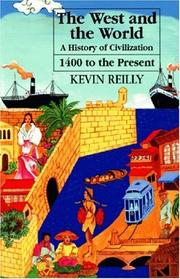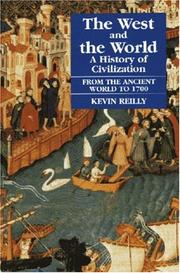| Listing 1 - 10 of 34 | << page >> |
Sort by
|

ISBN: 9781558761537 1558761535 Year: 2016 Publisher: Princeton, NJ Markus Wiener
Abstract | Keywords | Export | Availability | Bookmark
 Loading...
Loading...Choose an application
- Reference Manager
- EndNote
- RefWorks (Direct export to RefWorks)
Civilization, Western --- Civilization --- History

ISBN: 9781558761520 1558761527 Year: 2016 Publisher: Princeton, NJ Markus Wiener
Abstract | Keywords | Export | Availability | Bookmark
 Loading...
Loading...Choose an application
- Reference Manager
- EndNote
- RefWorks (Direct export to RefWorks)
Civilization, Western --- Civilization --- History
Book
Abstract | Keywords | Export | Availability | Bookmark
 Loading...
Loading...Choose an application
- Reference Manager
- EndNote
- RefWorks (Direct export to RefWorks)
Islam --- Muslims --- Civilization, Western --- Civilization, Western --- Culture and globalization.
Book
ISBN: 2361063875 2361063891 Year: 2016 Publisher: Auxerre (38, rue Rantheaume - BP 256 89004) : Editions Sciences Humaines,
Abstract | Keywords | Export | Availability | Bookmark
 Loading...
Loading...Choose an application
- Reference Manager
- EndNote
- RefWorks (Direct export to RefWorks)
Comprendre les transformations sans précédents qui caractérisent le monde contemporain, tel est l'objet de cet essai de « géohistoire ». Pour ce faire l'auteur retrace en une fresque dense et stimulante l'aventure de l'Occident depuis les Temps modernes jusqu'à aujourd'hui, à travers les deux mouvements majeurs qui la caractérisent dès le XVIIe siècle : la modernisation – utopie moderniste, triomphe des Lumières, affirmation des États nations, marche du progrès et ses remises en cause – et la globalisation, initiée à l'époque des Grandes Découvertes, qui bouleverse désormais la distribution des hommes et des activités économiques qu'avait modelée la révolution industrielle. Dans la perspective qui dominait encore récemment en Occident, les mutations étaient les bienvenues car elles étaient la manifestation du progrès auquel tout le monde aspirait. La situation actuelle est différente. Le mouvement est devenu source d'appréhension parce qu'on redoute qu'il ne mène à une vie plus difficile et à des catastrophes. Pour l'auteur, un aggiornamento de l'aventure occidentale s'impose afin que la tradition utopique créée il y a maintenant quatre siècles en Occident soit préservée et élargie à l'humanité entière.
Civilization, Western --- Globalization --- Civilization, Modern --- History.
Book
ISBN: 0231541406 9780231541404 9780231176729 0231176724 Year: 2016 Publisher: New York
Abstract | Keywords | Export | Availability | Bookmark
 Loading...
Loading...Choose an application
- Reference Manager
- EndNote
- RefWorks (Direct export to RefWorks)
Most historical accounts of "the West" take it for granted that the guiding principles of the Western tradition—reason, progress, and freedom—have been passed down directly from ancient Greece to modern Europe, evolving in isolation from all non-Western cultures. Today, many political analysts and cultural critics maintain that the Western tradition is fast approaching its end, for better or worse, as it becomes more and more integrated with non-Western cultures in an increasingly globalized world. But what if we are witnessing something else entirely—not the "end" of the West but rather another historical mutation of the idea of the West itself?This groundbreaking work shows that whether the West is hailed as the source of all historical progress or scorned as the root of all cultural imperialism, it remains a deeply problematic concept that is intrinsically connected to an ethnocentric view of the world. In a critical reading of the continental philosophers Husserl, Heidegger, Levinas, and Derrida as well as the postcolonial thinkers Said, Mohanty, Bhabha, and Trinh, Sean Meighoo strikes at the intellectual foundations of Western exceptionalism until its ideological supports show through. Deconstructing the concept of the West in his provocative interpretations of Martin Bernal's controversial publication Black Athena and the Beatles' second film Help!, Meighoo poses a formidable question to philosophers, writers, political analysts, and cultural critics alike: Can we mount an effective critique of Western ethnocentrism without reinforcing the very idea of the West?
Civilization, Western. --- Civilization, Western --- Ethnocentrism. --- Postcolonialism --- Continental philosophy. --- Culture --- Philosophy --- Intellectual life --- Teleology. --- East and West. --- Philosophy. --- Philosophy. --- Study and teaching. --- History. --- History.
Book
ISBN: 9787301271896 Year: 2016 Publisher: 北京 北京大学出版社
Abstract | Keywords | Export | Availability | Bookmark
 Loading...
Loading...Choose an application
- Reference Manager
- EndNote
- RefWorks (Direct export to RefWorks)
Civilization, Western --- Confucianism --- Philosophy, Confucian --- Chinese influences --- History --- China --- Foreign public opinion --- History.
Book
ISBN: 9782251445731 2251445730 Year: 2016 Publisher: Paris : Les Belles Lettres,
Abstract | Keywords | Export | Availability | Bookmark
 Loading...
Loading...Choose an application
- Reference Manager
- EndNote
- RefWorks (Direct export to RefWorks)
Cet essai a pour but de montrer comment la pensée critique née dans la Grèce antique a marqué durablement l'histoire occidentale puis s'est étendue à l'échelle mondiale et dans toutes les cultures religieuses. Cette analyse prend ses distances vis-à-vis des approches d'Hans Blumenberg, Marcel Gauchet et Rémi Brague et s'appuie sur la pensée satiriste de Lucien de Samosate.
Philosophie grecque --- Civilisation occidentale --- Influence --- Philosophy, Modern --- Civilization, Western --- Critical thinking --- Philosophy, Ancient --- Greek influences --- Greece --- Pensée critique --- Philosophie ancienne --- Philosophie moderne --- Influence grecque --- Pensée critique --- Civilization, Western - Greek influences --- Philosophy, Ancient - Influence --- Esprit critique. --- Civilisation occidentale. --- Influence.
Book
ISBN: 9781107154735 9781316650950 9781316608333 1107154731 1316608336 1316650952 1316659801 1316660508 Year: 2016 Publisher: Cambridge Cambridge University Press
Abstract | Keywords | Export | Availability | Bookmark
 Loading...
Loading...Choose an application
- Reference Manager
- EndNote
- RefWorks (Direct export to RefWorks)
Andrew Linklater's The Problem of Harm in World Politics (Cambridge, 2011) created a new agenda for the sociology of states-systems. Violence and Civilization in the Western States-Systems builds on the author's attempts to combine the process-sociological investigation of civilizing processes and the English School analysis of international society in a higher synthesis. Adopting Martin Wight's comparative approach to states-systems and drawing on the sociological work of Norbert Elias, Linklater asks how modern Europeans came to believe themselves to be more 'civilized' than their medieval forebears. He investigates novel combinations of violence and civilization through a broad historical scope from classical antiquity, Latin Christendom and Renaissance Italy to the post-Second World War era. This book will interest all students with an interdisciplinary commitment to investigating long-term patterns of change in world politics.
Civil society. --- Civilization, Modern. --- Civilization, Western. --- International relations. --- Nation-state. --- POLITICAL SCIENCE / International Relations / General. --- Violence. --- Nation-state --- International relations --- Civilization, Modern --- Civilization, Western --- Civil society --- Violence --- World history
Book
ISBN: 9780415840507 9780415840491 041584049X 0415840503 9781315714813 9781317502111 9781317502128 Year: 2016 Publisher: London/New York Routledge
Abstract | Keywords | Export | Availability | Bookmark
 Loading...
Loading...Choose an application
- Reference Manager
- EndNote
- RefWorks (Direct export to RefWorks)
"An Archaeology of the Immaterial examines a highly significant but poorly understood aspect of material culture studies: the active rejection of the material world. This is evident in a number of cultural projects, including anti-consumerism and asceticism, as well as other attempts to transcend material circumstances. Exploring the cultural work which can be done when the material is rejected, and the social effects of these 'dematerialisations', this book looks at the way people 'disengage' from the world as a specific kind of physical engagement which has profound implications for our understanding of personhood and materiality. Using case studies which range widely in time over Western societies and the technologies of materialising the immaterial, from icons to the scanning tunnelling microscope, Buchli addresses the significance of immateriality for our own economics, cultural perceptions, and emerging forms of social inclusion and exclusion. An Archaeology of the Immaterial is thus an important and innovative contribution to material cultural studies, demonstrating that the making of the immaterial as well as the material are both profoundly powerful operations which work to exert social control and delineate the borders of the imaginable and the enfranchised"--Provided by publisher.
Immaterialism (Philosophy). --- Material culture --- Asceticism. --- Transcendence (Philosophy). --- Technological innovations --- Civilization, Western. --- Social archaeology --- Study and teaching. --- Philosophy. --- History.
Book
ISBN: 9782228916400 2228916404 Year: 2016 Publisher: Paris Payot
Abstract | Keywords | Export | Availability | Bookmark
 Loading...
Loading...Choose an application
- Reference Manager
- EndNote
- RefWorks (Direct export to RefWorks)
La 4e de couverture indique : "Notre société est incapable d?assurer et d?assumer la transmission du savoir et de l?expérience depuis qu?elle a fait de la rupture le moteur de la modernité. Refuser tout héritage, faire table rase du passé, mépriser les modèles et les filiations, rompre systématiquement avec le père : ce geste ± moderne
Temps (philosophie) --- Présent (philosophie) --- Philosophy, Modern. --- Culture --- Civilization, Western --- History --- Philosophie moderne --- Civilisation occidentale --- Histoire --- Philosophy. --- Philosophy --- Philosophie --- Civilization, Modern --- Philosophy, Modern --- Multiculturalism --- Civilization, Modern - Philosophy --- Culture - Philosophy
| Listing 1 - 10 of 34 | << page >> |
Sort by
|

 Search
Search Feedback
Feedback About UniCat
About UniCat  Help
Help News
News